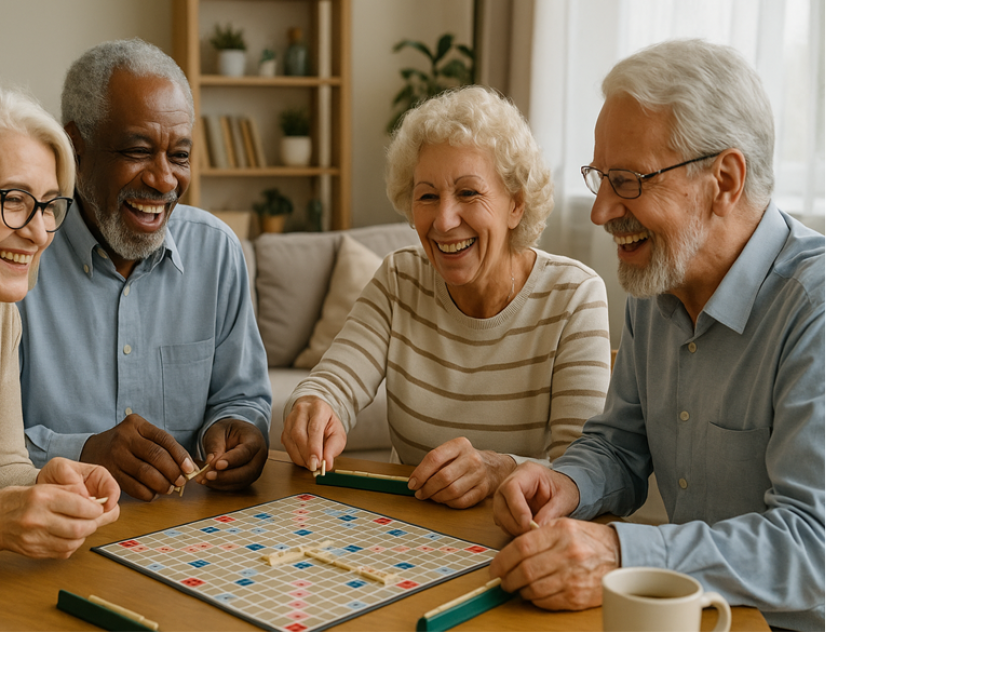Sharpening Social Skills for Seniors: Reconnecting After Loss

Social Skills for Seniors: Rebuilding Connections After Loss or Loneliness
Aging brings many changes—some beautiful, others deeply challenging. For many seniors, especially those who are newly single after the death of a spouse or a divorce, or those emerging from a long season of caretaking, loneliness can become a silent, daily struggle. But it doesn't have to be permanent. Reentering the social world is not only possible, it's essential for emotional and physical well-being.
Whether you’re in an assisted living community, enjoying independent living, or aging in place, sharpening your social skills can help you reconnect, build new relationships, and rediscover joy.
Why Social Skills Matter at Any Age
Strong social ties have been linked to lower rates of depression, better cognitive health, and even increased longevity. Yet many older adults lose confidence in their social abilities, especially after a long-term relationship ends or after spending years in a caregiving role.
Socializing may feel awkward at first, but like any skill, it improves with practice. It’s never too late to form new connections, and doing so can spark a renewed sense of purpose.
1. Skills to Hone for Meaningful Social Connection
Here are key social skills to focus on and ways to gently ease into them:
1.1 Active Listening
More than just hearing words, active listening involves giving someone your full attention. Make eye contact, nod occasionally, and give verbal affirmations like “I see” or “That makes sense.” Ask follow-up questions to show interest.
Try This: Practice with a family member or at a small group meeting. Focus on listening and asking a question without planning what you’ll say next.
1.2 Open Body Language
Crossed arms or avoiding eye contact can unintentionally signal disinterest. Try to maintain a relaxed posture, face the person you're speaking to, and smile often.
Bonus Tip: A gentle touch on the arm (when appropriate) can create warmth and trust.
1.3 Conversation Starters
Many seniors feel awkward starting conversations. Prepare a few go-to openers:
-
“How did you hear about this event?”
-
“What other things do you like to do?”
-
“Are you from this area?”
Avoid jumping into sensitive topics too soon. Instead, build rapport slowly.
1.4 Emotional Resilience
Rejection or awkward moments may happen—but they don’t mean you’ve failed. Developing emotional resilience means accepting that not every interaction will click and trying again anyway.
Reframe setbacks as learning opportunities rather than personal failures.
2. Places to Meet People and Rebuild Community
Whether you live independently or in a senior living community, there are a variety of welcoming spaces to connect with others.
2.1 Community Centers and Libraries or your local gym
Local senior centers and libraries offer everything from book clubs and lectures to yoga and art classes. These spaces are ideal for low-pressure, recurring interactions that foster natural connections based on mutual interests.
2.2 Faith-Based or Spiritual Groups
Many people find comfort and community in churches, temples, or meditation groups. If you’ve experienced loss, grief groups or spiritual discussion circles can be especially grounding.
2.3 Senior Living Communities
If you’re transitioning into assisted living or independent living, take advantage of on-site events like movie nights, cooking classes, and resident councils. These events are designed to encourage social engagement in a relaxed setting.
2.4 Volunteering Opportunities
Volunteering offers two benefits: it allows you to give back while also meeting people with shared values. Look for roles that align with your skills—mentoring, gardening, or administrative help for local nonprofits.
2.5 Hobby and Interest Groups
Love to dance, knit, or play cards? Joining a group that meets weekly around an activity you enjoy is one of the best ways to connect without the pressure of constant conversation.
3. Engaging People Authentically
Once you’re in the right environment, how you engage makes all the difference.
3.1 Be Curious, Not Critical
Ask questions that show curiosity about someone’s life, and avoid jumping to conclusions. Everyone brings a unique story and perspective to the table.
3.2 Share a Little of Yourself
Vulnerability builds connection. Share small, appropriate pieces of your own story—where you’re from, a hobby you love, or a funny memory. People are more likely to open up when you do.
3.3 Follow Up
If you enjoyed a conversation, don’t let it fade. Ask if they’ll be at the next event or exchange contact info. Friendships blossom through consistency.
4. Reentering the Social Fabric After Caretaking or Loss
The transition from caregiver or spouse to a more independent identity is deeply emotional. You may feel unsure of who you are now or guilty for wanting joy again. These are normal feelings—and connecting with others can help you heal.
4.1 Allow Yourself to Grieve and Grow
Rebuilding social connections doesn’t mean forgetting your loved one. It means expanding your life to include new experiences and relationships.
4.2 Go Slow and Be Gentle With Yourself
Start with one new activity a week. Choose social settings where you feel safe and supported. If you need help getting there, ask a friend or family member to go with you.
4.3 Consider Therapy or Support Groups
A therapist or grief counselor can help you work through emotional blocks that may be keeping you isolated. There are also many peer-led bereavement and widow/widower groups.
5. Final Thoughts: Courage, Confidence, and Connection
Social skills aren’t lost with age—they just need a little polishing. You bring a wealth of life experience, wisdom, and compassion to every room you walk into. That is your strength.
Whether you’re navigating senior living, independent living, or aging in place, human connection is essential. Start small. Smile at someone new. Ask a question. Show up.
The fabric of life is made richer when it includes you.